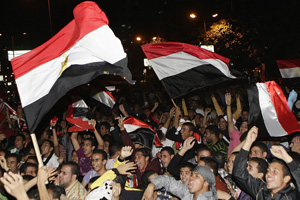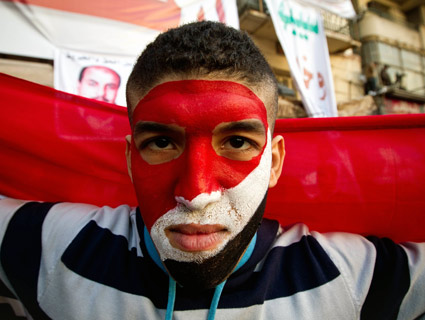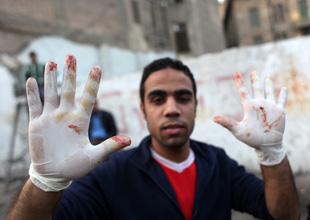
Photo by <a href="http://www.flickr.com/photos/70225554@N00/4105517992/">Muhammad Ghafari</a>/flickr
At Sports Illustrated, Dave Zirin analyzes the role of Egypt’s “most organized, militant” soccer clubs in organizing opposition to the Mubarak government. He quotes Egyptian blogger Alaa Abd El Fattah, who told Al-Jazeera that the clubs “have played a more significant role than any political group on the ground at this moment.” Explains Zirin:
The critical role of Egypt’s soccer clubs may surprise us, but only if we don’t know the history that soccer clubs have played in the country. For more than a century, the clubs have been a place where cheering and anti-government organizing have walked together in comfort. Egypt’s most prominent team, Al Ahly, started its club in 1907 as a place to organize national resistance against British colonial rule. The word Al Ahly translated into English means “the national,” to mark their unapologetically political stance against colonialism. Al Ahly has always been the team with the most political fans. It’s also a team that’s allowed its players to make political statements on the pitch even though this is in direct violation of FIFA dictates. It’s no coincidence that it was Al Ahly’s star player Mohamed Aboutrika, aka “the Smiling Assassin,” who in 2008 famously raised his jersey revealing the T-shirt, which read “Sympathize with Gaza.”
Soccer fans are notorious troublemakers. Egyptians are prime offenders: In 2009 things got ugly after a heated match against nearby Algeria. Here are some other examples of the sport’s political side in the region:
- In a show of solidarity with citizens protesting Iran’s disputed 2009 elections, six national team footballers wore green wristbands in a World Cup qualifier. The act drew attention from around the world and embarassed the Iranian government, which banned four of the players from the team for life.
- Soccer relations aren’t usually too friendly between Israel and Palestine, but University of Florida sociology professor Tamir Sorek says the sport promotes good vibes within Israel. In his 2007 book Arab Soccer in a Jewish State, Sorek writes that Arab soccer fans living in the country cheer teams on in Hebrew and are more inclined to vote for Zionist politicians.
- Under Taliban rule, women could not participate in sports in Afghanistan. But after the regime’s fall in 2001, Abdul Saboor Walizadah began organizing a women’s soccer team. In 2007 the team traveled abroad for the first time for a series of friendly matches against Pakistan. Last year, it defied fundamentalists and played a secret match against a NATO team in Kabul.
- The Iraqi national team stunned the world by advancing to the semifinals at the 2004 Summer Olympics in Athens. It provided a brief moment of calm for the war-torn nation until President Bush angered players by trying to use their success to score political points.
- After FIFA (soccer’s international governing body) announced that Qatar would host the 2022 World Cup, the Harvard Crimson applauded the decision for “fostering a sense of internationalism” that would “generate optimism for the future of the region.” It might also force the Middle East to take another look at gay rights: Because of Qatar’s discriminatory laws against homosexuality, FIFA president Sepp Blatter made headlines for suggesting that gays in the country for the Cup should “refrain from sexual activity.”

















